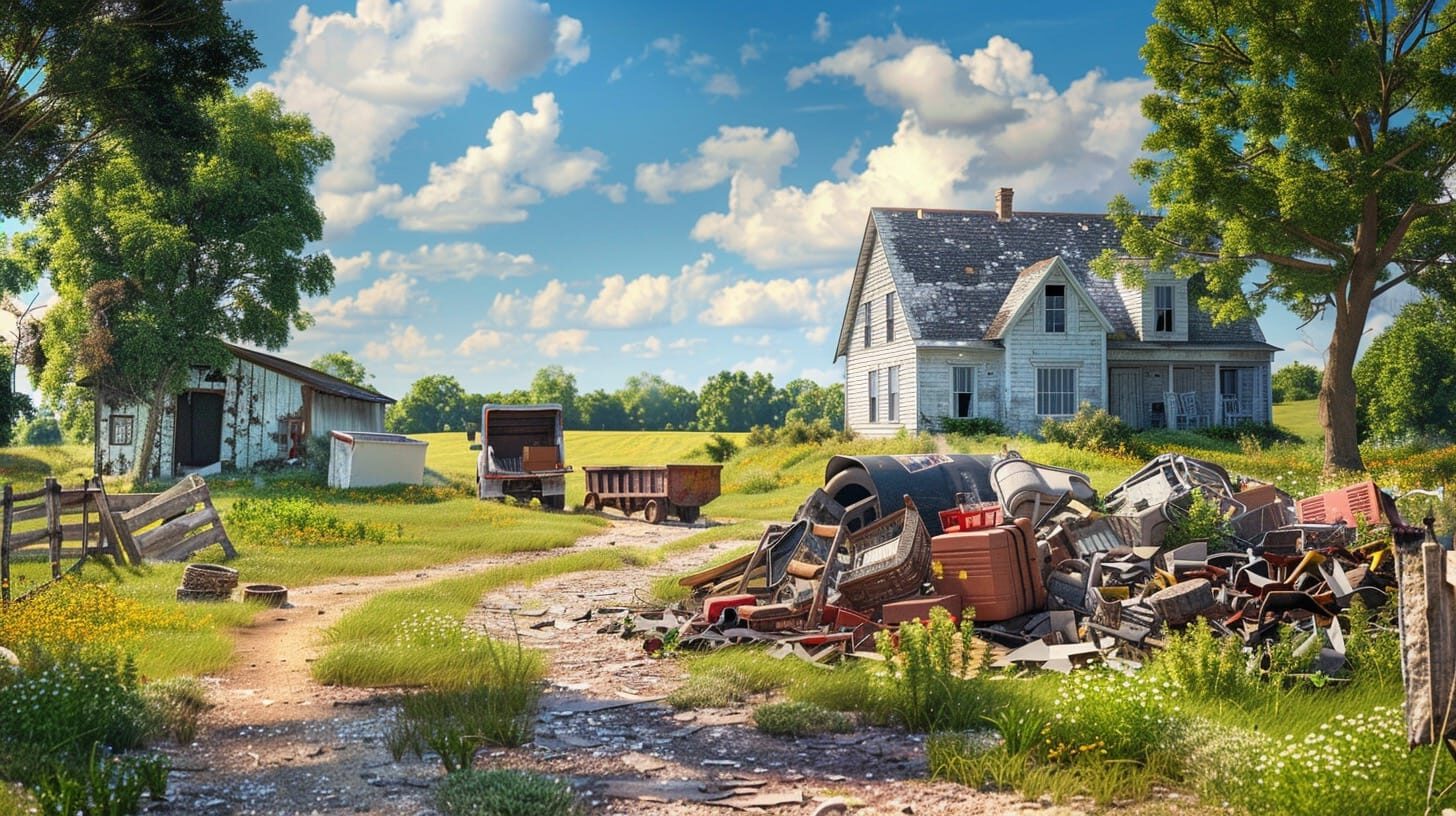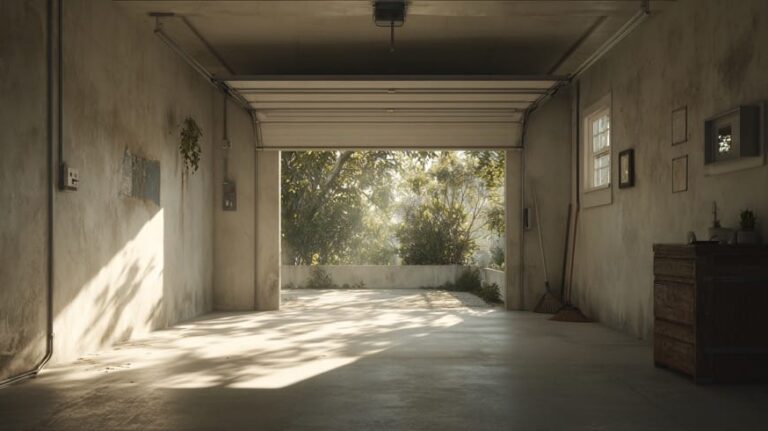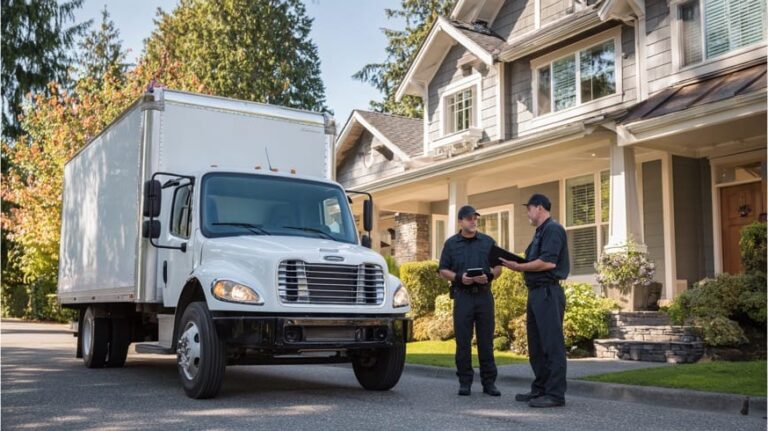Living in a remote or rural home often comes with perks—wide-open spaces and peace and quiet. But when it comes to junk removal, that isolation can be a real headache. No curbside pickup, long drives to the dump, and limited local options. So, what are the best junk removal options when you’re miles away from civilization? In this article, we’ll explore smart, practical solutions—from taking matters into your own hands to hiring the right services. Let’s dive in.
Why Junk Removal Is Especially Challenging in Rural Areas
- Limited access to municipal services
Most rural counties don’t provide curbside trash service, and pay-as-you-go drop-off stations may be the only option. - Long distances to disposal sites
You might be logging hours and gas just to dump a load at the nearest landfill or transfer station—far from city convenience. - Strict burning, dumping laws
Many rural zones have bans or regulations on burning brush, burying old appliances, or dumping—violations can carry fines. - Seasonal road issues
Dirt roads go from dusty to impassable in rain or snow, making trips to town unpredictable.
Top Junk Removal Options for Rural Homeowners
DIY Junk Hauling to Local Landfill or Transfer Station
Why it works:
- You set the schedule and only pay dump fees.
- You stay in control—no waiting for appointments or service areas.
Downsides:
- Requires a truck or trailer.
- Time-consuming, especially when factoring in travel, load time, and potential line-waiting.
- Must know station rules—what’s accepted, their hours, and any seasonal closures.
Pro tips:
- Call ahead for hours, fees, and banned items.
- Consolidate junk at home for efficiency.
- Pack efficiently in your trailer or truck—flat loads allow more in one trip.
Local Junk Removal Services That Cover Rural Areas
If you don’t have a vehicle, or just want the work done, local junk haulers are a solid pick.
How to find them:
- Ask neighbors or check local Facebook or courthouse bulletin boards.
- Call and confirm they serve your zip code and ask for fuel or mileage surcharges.
What to ask:
- Do you serve remote addresses?
- What’s included in your pricing—hourly, volume, flat fee?
- Are there extra fees for remote travel, bulky items, or dumping?
Why it’s worth it:
- They bring labor, load your junk, and deal with disposal—no driving required.
- Locally owned businesses often know township laws and community disposal days.
Dumpster Rental Services for Rural Properties
Renting a roll-off dumpster can be ideal for major cleanups—barn clear-outs, renos, or property-wide junk.
Size and placement tips:
- Common sizes range from 10 to 40 cubic yards.
- Your driveway must be flat and accessible.
- Place plywood underneath to prevent damage to gravel or asphalt.
Avoid these common mistakes:
- Don’t pick a dumpster that’s too small—you’ll pay extra later.
- Never overfill or go past the weight limit—fees can skyrocket.
- Know prohibited items—paints, oils, batteries, tires, etc.—and remove them before dumping.
- Permits may be required for street placement, even on private roads .
Smart preparation:
- Call early—especially in peak seasons like spring and fall.
- Ask about lead times for delivery and pickup.
- Load evenly—put heavy stuff in first and smaller junk on.
- Cover it with a tarp to keep wind/rain debris contained.
Community Clean-Up Events or Township Services
Many rural communities host seasonal bulk junk collection days or clean-up events.
How to find them:
- Check your county website, Facebook group, township newsletter, or community bulletin boards.
- Look for “bulk waste day,” “community cleanup,” or “hazardous waste drop-off.”
Why they’re helpful:
- Typically low-cost or free.
- Convenient—they bring collection sites to you.
- Offer proper disposal for items like electronics or appliances, sometimes with minor fees.
Reuse, Repurpose, and Donate Before You Dump
Clearing out doesn’t always mean landfill—it could mean donation.
Where your things can go:
- Yard sales or online platforms like Facebook Marketplace or Craigslist.
- Freecycle/Buy Nothing Groups.
- Farm supply stores and feed outlets may take old tools, buckets, or building supplies.
- Goodwill or thrift stores—check rural drop-off locations.
Benefits:
- Reduces landfill fill.
- Saves money on disposal.
- Helps neighbors in need.
Special Considerations for Rural Junk Types
- Agricultural Equipment & Scrap Metal
- Junkyards and scrap dealers may pay you for old tractors and machinery—worth checking before dumping.
- Some metal recyclers offer pickup for large farm equipment.
- Abandoned Vehicles
- Junking services often tow for free but charge disposal—sometimes covered by scrap value.
- Construction & Renovation Waste
- Heavy debris (like concrete) raises dumpster weight – consider lighter containers and frequent haul-outs.
- Yard Waste & Brush
- Burning restrictions may apply—check air-quality guidelines.
- Many waste facilities accept yard waste—get local station contact info.
Cost Comparison: Rural vs. Urban Junk Removal
Rural removal typically costs more due to:
- Distance/labor: Haulers charge for fuel/time.
- Limited availability: Fewer service options may lead to higher bids.
- Permit & surcharge variance: Rural roads might need road permits or night pickup fees.
- Seasonal closures: If your station is seasonal, you may pay more to go elsewhere.
Ways to cut costs:
- Group clean-ups with neighbors for bulk rental savings.
- Off-season scheduling can net discounts.
- Negotiate flat-rate trips to avoid per-mile or per-ton surprises.
- DIY partial solutions: use a trailer for lighter items, hire hauler only for heavy, bulky junk.
How to Choose the Right Option for Your Property
Use this simple checklist:
- Job size: Is this a small seasonal clean-up or a full renovation?
- Access: Can a truck or dumpster reach you?
- Tools & equipment: Do you have a trailer? Need labor?
- Budget: DIY vs. hired service—what’s more cost-effective overall?
- Permits: Will a dumpster need a permit?
- Timeline: Flexible or fast?
Example Scenarios:
- DIY for small loads: Use your trailer for trips to town once a month.
- Dumpster for big jobs: Barn clean-out? Get a 20–25 yard container on-site for 1–2 weeks.
- Local hauler: No pickup or haul capability? Hire someone who’ll bring the truck and do the lifting.
- Community event: Small, occasional junk? Bulk day drop-off saves money.
Tips to Avoid Junk Accumulation in the Future
- Routine purge
- Quarterly or seasonal clean-outs prevent clutter from piling up.
- Organized storing
- Use clear bins or labeled storage for seasonal gear—keeping it out of junk piles.
- Sell or donate regularly
- Set aside usable items for sale or donation every few months.
- Rent a bin long-term
- For ongoing projects like building a shop or hobby work, long-term dumpster rental might pay off.
- Barter services
- Offer lawn-mowing or painting in exchange for hauling assistance with neighbors!
Remote living doesn’t mean you’re stuck with old junk forever. Whether you’re hauling it yourself, renting a dumpster, or hiring help—there’s a solution that fits your lifestyle, budget, and schedule. And before it goes to waste, ask: Can it be sold, donated, or reused? You’ll save time, money, and landfill space.
What should you do next?
- Estimate the scope—big load or small?
- Choose your method:
- DIY trailer run?
- Dumpster for a massive cleanout?
- Call a hauler for no-lift ease?
- Get 2–3 quotes for services or borrow a trailer from a friend.
- Beat the rush—book now for the best scheduling and pricing.





